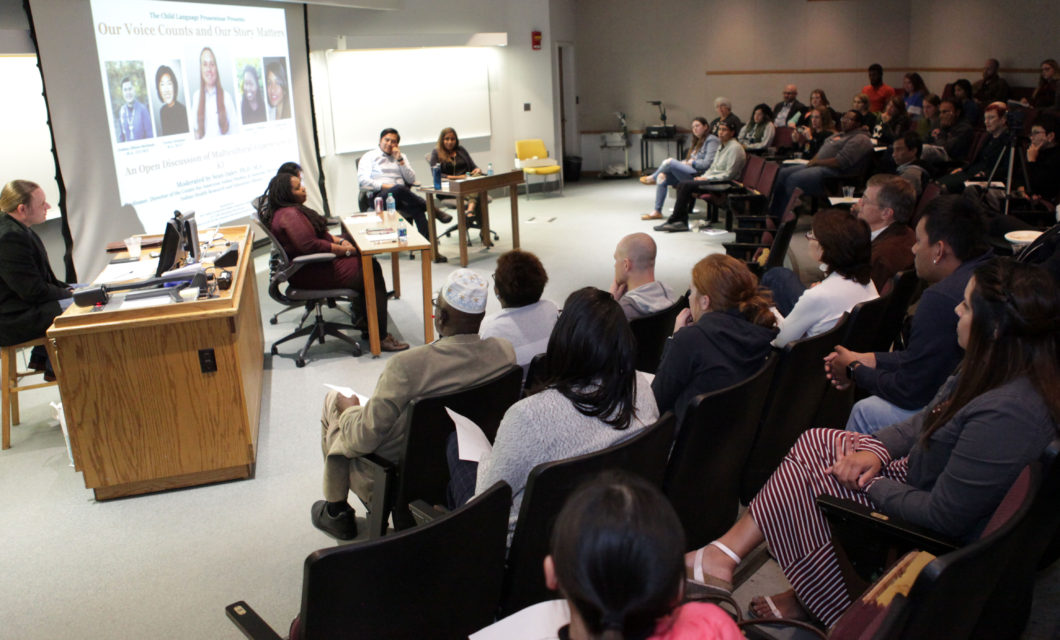From being asked repeatedly if we speak Spanish based on our skin color, to being excluded from class discussion as the only minority, several of us doctoral students at the University of Kansas (KU) have experienced discrimination in our doctoral work.
We know that many times, folks don’t know what to do to support diversity and inclusivity. So, we decided to host a community forum about our experiences and perspectives. Our goal was to discuss our experiences at KU in our respective academic programs, particularly our difficulties, and to identify ways as a group to move forward.
Moderated by Dr. Sean Daley, PhD, the event took place in October 2017. Teresa Girolamo (myself), Joshuaa Allison-Burbank, Brittany Williams, and Kavita Indar discussed our multicultural experiences at KU, in CSD, and in higher education.
Our Panel—Bridging Divides
To begin the panel, we introduced ourselves and responded to questions from Dr. Daley, such as:
- Tell me about a time when you felt uncomfortable at KU due to your race, ability, etc.
- How have you learned to navigate that?
We shared with the audience that the difficulties we faced as racial/ethnic minorities were often invisible to others. We felt it was important to share our survival strategies as minorities at KU, in our fields, and in the area where KU is located. This way, folks might know what we are up against as we strive to build academic-research careers.
In response, audience members also discussed times when they, too, felt uncomfortable or were the perpetrators of such an experience.
The overall mood of those in attendance was enthusiastic and inquisitive. With more than 50 people in attendance, the room was packed with students and faculty from both KU and neighboring Haskell Indian Nations University, as well as community members. Folks who were not minorities wanted to learn, and folks who were minorities wanted to share.
We closed the forum by discussing steps, both collective and individual, that folks can take to break down barriers that hinder diversity and inclusivity in our communities:
- Build relationships with folks who are not like you and come from different walks of life. This is how we change our minds for the better and work against stereotypes.
- Be aware of – and learn about – the difficulties others face. While many of our white classmates are shocked to hear about the racism we face on campus, it’s unsurprising to minority students at KU.
- Students should advocate for culturally responsive mentoring in their academic coursework. Don’t be afraid to ask for support specific to your needs as a minority student.
Tips for Hosting a Multicultural Panel at Your School—And Why It’s Important
As of 2017, just 8% of ASHA’s 197,856 members were racial minorities. Yet, we know there is a gross need for bilingual service providers, and culturally competent service providers, who are able to effectively build rapport and deliver services that are responsible to the influence of cultural and linguistic diversity.
Increasing diversity and inclusivity at traditionally white institutions, in our field, and in higher education is crucial for the clients we serve and the students we teach.
We hope other NSSLHA chapters and CSD departments read about our experience and take steps to host similar community forums about multicultural topics. It can only open up discussion about diversity and inclusivity in your communities too!
Here are some tips we found helpful in developing our panel:
- Set the tone. Before getting started, Dr. Daley made a statement to affirm that respect was paramount at the forum. People came there to speak, to listen, and to learn from one another, even if they may have felt uncomfortable.
- Provide structure for audience participation. It can be challenging for folks to share their experiences in front of a large audience, especially because speaking about personal experiences with discrimination can leave you emotionally vulnerable. Small group discussions were much more feasible.
- Make it your own. We know diversity and inclusivity embody a wide range of issues. Identify the issues that are the most relevant to you and your community. Use those to create talking points.
Moving Forward
Our panel was well attended and is now an annual event at KU. Next year, we plan to explicitly discuss how increasing diversity and inclusivity is a continuum of actions that everyone can take, from students to faculty to community members.
We also plan to partner with neighboring Haskell Indian Nations University, the largest intertribal university in the United States.
It’s important that we all take steps now, as students, to become more culturally competent, so we can best serve our clients moving forward. It’s also important for minority students to have explicit opportunities to share these experiences so departments are aware of the experiences of all their students and provide culturally responsive teaching and mentorship.


Thank you so much for writing a blog post about this panel you and your classmates facilitated at KU. I am a first-year graduate student and have found solace in a small, student-run program for students of color that we have at my university. I have found so much solace in sharing my experiences and hearing about the experiences of other students of color in my department. As a Latina woman who is not perfectly fluent in Spanish, I have experienced countless microagressions in this last year of grad school alone. Thank you again for sharing your experiences.